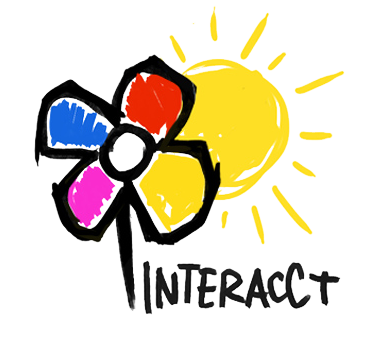Interacct
Hematopoietic stem cell transplantation (HSCT) treats serious malignant and non-malignant diseases (e.g. leukemia or sickle cell anaemia) by destroying the patient's ill immune system and replacing it with new, healthy stem cells. It is a life saving procedure for children and adults with cancer or blood diseases. However, the procedure itself is still associated with considerable morbidity and high risk for mortality (approximately 40%) due to infection, toxicity and immunologic complications. Over the past years, progress in HSCT has significantly improved survival, but mortality has been shifted into the long-term follow-up. In this context, high quality aftercare is an essential part of the therapy, and in particular prompt information is warranted to enhance early diagnosis and to deliver appropriate treatment.
The project INTERACCT investigates the design and development of an E-Health platform specially focusing on juvenile HSCT patients in aftercare. INTERACCT is mainly meant to improve the communication between patients and clinicians in order to detect possibly life-threatening complications as soon as possible. In this context, compliance of patients to follow the treatments as well providing their health status to the clinicians is one of the main factors for survival.
INTERACCT specially focuses on supporting compliance by making the design as child friendly as possible. This includes a fun and entertaining user interface, as well as the provision of specific computer games inside an online world. Although we focus on juvenile HSCT patients, we think that our approach can be generalized to any child related chronic disease.
The entertaining and playful INTERACCT Web platform is developed in a multidisciplinary approach at the interface of clinical research, design thinking and information communication technology (ICT). Augmented clinician-patient communication may enable the clinician to early identify behavioral changes which precede manifest symptoms of diseases. Furthermore the tool will be adaptive to developing problems e.g. enhanced "drinking games" if fluid intake is decreasing. An entertaining user interface specially designed for juvenile patients should foster interaction with the tool and improve long term treatment adherence. In the long run, the use of INTERACCT could lead to earlier diagnosis and, thus, to a better quality of care after HSCT.
INTERACCT therefore should have the look and feel of modern entertainment platforms, including various elements of entertainment, challenges, games and social aspects, etc. Seen from the children's perspective, INTERACCT delivers mainly entertainment, and is a source of challenges, competitions, empowerment and fun. The E-Health aspects of fostering compliance, communication, and treatment should be visible, but not dominating.
INTERACCT does not require any newly created hardware devices. Unlike other E-Health projects, we do not aim at using special health sensor hardware that automatically detects and sends health data. Data collection will only include information as requested in the patient handbook like eating and drinking behavior, bowel movement, observation of pain etc.). Any clinical examination will only take place in the hospital during the regular mandatory visits.
Therefore, INTERACCT is a pure software solution, but will integrate state-of-the-art low-cost and off-the-shelf consumer equipment like web cams, smart phones or a Kinect sensor to increase the fun factor for children and adolescents. Also, we do aim at using the Kinect or even Android based smartphones as input sensors for health data. The Kinect for instance can be used to guide treatment games fostering movement. Also, we aim at analyzing player performance data to help clinicians in detecting worsening of a patient´s condition.




